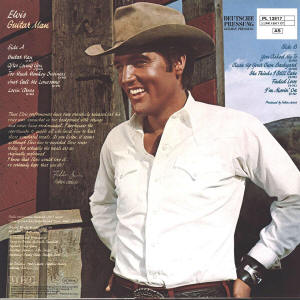

In January 1981 RCA released an album called
"Guitar Man". On the 14th of the following month
it entered Billboard's "Top LPs Chart" for 12
weeks and peaked at number 49. On February 21st
the longplayer also entered the "Hot Country LPs
Chart". Here it had a run of 31 weeks and
charted at number 6. The album sold a million
units, which can be translated to 150 million
paid streams of the complete album or 1.5
billion paid streams of individual tracks.
Talking about streaming: Sony hasn't issued a
digital release yet.
After the "less is more" approach of the "Our
Memories Of Elvis" releases hadn't paid off
commercially, RCA tried to come up with
something new. This time they wanted to
modernize the sound by recording new music
tracks. Throughout 1980 several sessions were
staged at Young 'un Sound Studio in
Murfreesboro/Tennessee. Just like in the old
days, when Elvis was alive, the tracks were
produced by Felton Jarvis. Chip Young, a former
studio musician of the king and now the owner of
the recording facility, acted as sound engineer.
Some of the musicians, like Chip himself
(guitar), David Briggs (piano), Larrie Londin
(drums) and Mike Leech (bass) also had worked
with Elvis. The goal was to beam the king's
music into the new decade give the songs a
modern sound.
The 45 "Guitar Man" / "Faded Love" was the
forerunner of the album and made it to the top
of Billboard's chart for country & western
singles. On the more important "Hot 100" the
750,000 sold units were enough to get the
release to number 28. Later RCA also issued
"Loving Arms" / "You Asked Me To". It sold a tad
worse, wasn't listed on the "Hot 100", but
peaked at number 6 of the chart for country
music.
For the album cover RCA used a photo from the
movie "Stay Away, Joe". It showed a smiling,
tanned Elvis wearing a cowboy hat. Even though
"Guitar Man" wasn't promoted as a country album,
it was aimed at this very segment of the market.
Guitar Man
The title song was recorded on September 10,
1967. The new music track sounds less exciting
than the original recording, especially the
steel guitar, which substituted Jerry Reed's
great original guitar track, is a let down.
However, in contrast to the original release the
new one includes a few lines of "What'd I Say".
After Loving You
Once again all the egdes are gone. The song
sounds very smooth, especially the harmony
singers turn "After Loving You" into some kind
of radio music. The original track was recorded
on February 18, 1969 at the American Sound
Studio in Memphis.
Too Much Monkey Business
Surprisingly the Chuck Berry song was handled
the opposite way. Now it features an electric
guitar and the drums are way more prominent in
the mix. I wouldn't prefer the 1980's version to
the original, but at least it hasn't gotten
worse.
Just Call Me LonesomeNow it
gets even better. The smartly paced beat and the
steel guitar are a real improvement and I cannot
help to like this one better than Elvis'
original version from 1967.
Loving ArmsThis ballad also
benefits from the new arrangement. It's a tad
simpler, I especially like the steel guitar and
the subtle harmony vocals. The original was
recorded on December 13, 1973 at Stax in
Memphis.
You Asked Me To
Two days earlier the king had taped a cover
version of Waylon Jennings' "You Asked Me To".
The major differences to Elvis' original
recording are the guitar and drum parts. The
sound a little more modern.
Clean Up Your Own Backyard
Elvis recorded the track on October 23, 1968 for
the MGM motion picture "The Trouble With Girls
(And How To Get Into It)". The new arrangement
features an electric guitar and the drums sound
somewhat more jaunty.
She Thinks I Still CareOn
February 2, 1976 Elvis tried out three different
styles. The first try was based on George Jones'
original recording, afterwards he gave the song
a more bluesy touch, before he finally settled
for the well known arrangement. For the "Guitar
Man" project Felton Jarvis used the bluesy
version and so this one vastly differs from the
track on the single "Moody Blue" / "She Thinks I
Still Care" (1976). For me this song is the
highlight of the album.
Faded LoveThe remake sounds
more polished than Elvis' original release, I
especially like the steel guitar and the harmony
vocals. The king recorded "Faded Love" on June
7, 1970 at RCA Studio B in Nashville.
I'm Movin' On
The album ends with "I'm Movin' On". Maybe this
was considered to be the statement of this
release. Elvis was moving on, his music was
adjusted to the current taste of the masses. The
new arrangement sounds more funky, in contrast
to the original it includes an electric guitar
and a steel guitar. But it's also less edgy.
Verdict
The album succeeds in beaming Elvis'
music into the early 1980s. Unfortunately
the contemporary taste was shallow radio
music and therefore most of the songs sound
less interesting than the original
recordings. However, there are also some
songs worth listening to.

(C) RCA Victor
![]()

